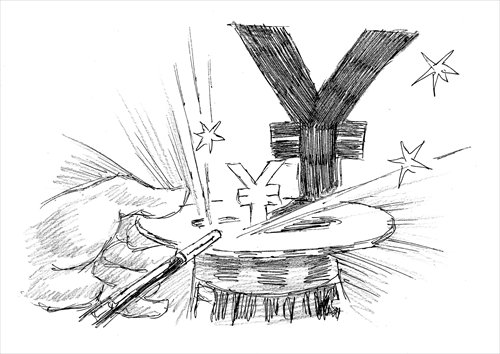

 |
| Illustration: Peter C. Espina/GT |
The central bank has called on international institutions not to engage in speculative activities against the yuan. An article posted on the website of the People's Bank of China (PBC), the central bank, on January 7 said that "the speculative activities launched by overseas institutions and individuals to reap profits" did not reflect the real situation in China in terms of demand and supply, and could "lead to abnormal volatility in the yuan rate, sending the wrong signal to the market." It seems the battle to defend the yuan is heating up.
The PBC has also taken some measures to fight against the international short sellers. One move was reportedly buying up offshore yuan, to raise the offshore yuan rate and thereby eliminate the profits from short selling. Another move was to drive up the overnight Hong Kong interbank offered rate (HIBOR), a daily benchmark interest rate for offshore yuan interbank lending, to increase the borrowing costs for international investors.
As a result, the offshore yuan rate strengthened significantly on Monday, and the overnight HIBOR rose to 13.4 percent, up from 4 percent on Friday, tightening liquidity and forcing yuan speculators to pay much higher interest rates to close up positions.
The central bank's strategies have proved effective in the first war against international investors in the offshore yuan market, as the onshore and offshore yuan rates both strengthened on Monday. It also signaled that the PBC will strike back against reckless gambling with the yuan and prevent its continued depreciation in the international market.
But whether these efforts will continue to succeed is quite uncertain. For the Chinese and global markets, the issue of yuan depreciation can be viewed as one of the biggest uncertainties in 2016.
This is because market participants don't really know what the PBC wants to achieve with the yuan exchange rate, which raises certain questions. Does the PBC want to relieve pressure resulting from a severely overvalued yuan, or to enhance the yuan rate's elasticity so that the exchange rate formation mechanism will be more marketized? Does the PBC intend to elevate the yuan's status in the international market, or to reduce the costs of stabilizing the yuan rate and increase the central bank's flexibility in its monetary policy? The market is not sure where the PBC stands.
For the time being, the PBC seems to be struggling with different choices. If it intends to allow the yuan rate to be more marketized, to enhance the elasticity of fluctuations of the yuan exchange rate and reduce the cost of stabilizing the yuan rate, then the currency will face huge depreciation risks. A weakened yuan would not only result in huge capital outflows that could damage China's stock market and trigger volatility in global markets - it would also hamper the advancement of the yuan's internationalization, and could lead to strengthened expectations for further depreciation.
This would prompt bigger problems in the financial markets, domestically and internationally.
However, if the PBC is going to continue to maintain the stability of the yuan exchange rate, it will be costly and could twist the price mechanism of China's financial market and hurt economic growth. Hence, with the yuan having joined the IMF's Special Drawing Rights (SDR) currency basket, the PBC hopes to allow the yuan to become slightly weaker at a gradual pace, so as to enhance elasticity in fluctuations of the rate.
But domestic and overseas market participants tend to believe that the PBC's stance on a stable yuan rate has changed, and that it has started on a path of depreciation. This expectation for further depreciation is the fundamental reason for the recent short selling of yuan by international institutional and individual investors. Under such circumstances, the Chinese central bank has no choice but to intervene in the international market, because if it allowed such a trend to strengthen, then China would face an even more difficult situation.
The PBC may have been successful this week, but it's still uncertain how effective further interventions will be. And while its intervention curbs international speculation, it also hurts the PBC. More importantly, as has been pointed out, too many interventions would distort the market pricing mechanism, dampening investors' confidence in the yuan and adding to confusion over the PBC's real policy goals. If the PBC is uncertain of its policy on the yuan rate, it will only add to market uncertainty, but a weakening yuan could severely affect the market.
The author is a professor with the College of Economics at Qingdao University.
 Charming female soldiers on Xisha Islands
Charming female soldiers on Xisha Islands Beautiful skiers wear shorts in snow
Beautiful skiers wear shorts in snow Getting close to the crew on China's aircraft carrier
Getting close to the crew on China's aircraft carrier A beauty's dancing youth
A beauty's dancing youth "Rent me as your girlfriend!"
"Rent me as your girlfriend!" Chinese stewardess celebrate test flight at Nansha Islands
Chinese stewardess celebrate test flight at Nansha Islands World's first 'underwater skyscraper'
World's first 'underwater skyscraper'  Top 10 weapons in the world in 2015
Top 10 weapons in the world in 2015 Are these the world’s scariest landing strips?
Are these the world’s scariest landing strips? Top 20 hottest women in the world in 2014
Top 20 hottest women in the world in 2014 Top 10 hardest languages to learn
Top 10 hardest languages to learn 10 Chinese female stars with most beautiful faces
10 Chinese female stars with most beautiful faces China’s Top 10 Unique Bridges, Highways and Roads
China’s Top 10 Unique Bridges, Highways and Roads Broadcast trial tests public’s legal awareness
Broadcast trial tests public’s legal awareness A look at the demographics of China’s movie-going population
A look at the demographics of China’s movie-going population Over 70% of young people find ways to watch porn despite crackdown survey
Over 70% of young people find ways to watch porn despite crackdown survey Leftists and rightists battle over how to interpret stories of China’s revolutionary past
Leftists and rightists battle over how to interpret stories of China’s revolutionary pastDay|Week